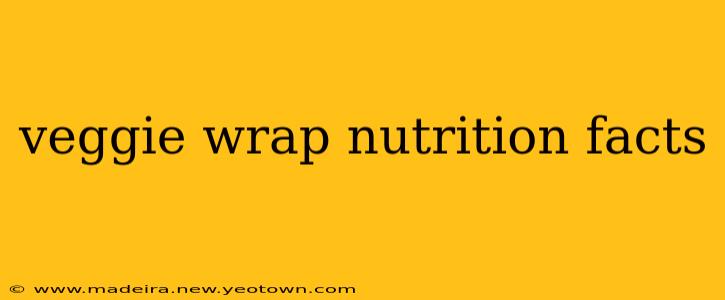Veggie wraps have exploded in popularity, offering a convenient and healthy alternative to traditional sandwiches. But just how nutritious are these seemingly simple meals? Let's unravel the nutritional facts and explore the many variables that determine the overall health benefits of your veggie wrap. This isn't just about calories; we'll delve into the vitamins, minerals, and potential downsides to give you a complete picture.
What are the typical nutritional values in a veggie wrap?
This is where things get interesting. The nutritional content of a veggie wrap is incredibly variable, depending heavily on the ingredients. A basic veggie wrap might consist of a whole-wheat tortilla, hummus, various vegetables (lettuce, tomatoes, cucumbers, carrots, peppers), and maybe some sprouts. This version is generally low in calories and fat, but rich in fiber, vitamins, and minerals. However, add in cheese, avocado, or a creamy dressing, and the calorie and fat content can significantly increase. A typical "healthy" veggie wrap might contain around 300-400 calories, 5-10g of fat, and 20-30g of carbohydrates, with a substantial amount of fiber and protein depending on the additions.
How many calories are in a veggie wrap?
As mentioned above, calorie counts wildly fluctuate. A simple veggie wrap with lean protein and minimal added fats might clock in around 250 calories, whereas a loaded version with creamy sauces, cheese, and high-calorie fillings could easily exceed 600. To accurately determine the calorie count of your veggie wrap, I highly recommend utilizing a nutritional tracking app or website where you can input your specific ingredients. This allows for the most accurate calorie assessment.
What are the benefits of eating a veggie wrap?
The beauty of a veggie wrap lies in its versatility and potential health benefits. When made with whole-wheat tortillas and plenty of colorful vegetables, a veggie wrap can be a fantastic source of:
- Fiber: Essential for digestive health, promoting regularity and satiety.
- Vitamins and Minerals: A rainbow of vegetables provides a wide spectrum of essential nutrients.
- Protein: Adding beans, lentils, tofu, or even grilled chicken can boost the protein content, making it a more complete meal.
Furthermore, veggie wraps can be a more convenient and portable lunch or dinner option compared to heavier meals, making them ideal for busy lifestyles.
Are veggie wraps healthy?
The answer to this question hinges entirely on the ingredients. A veggie wrap packed with fresh vegetables, lean protein, and a light dressing is undeniably a healthy choice. However, a wrap laden with processed meats, creamy sauces, and excessive cheese transforms it into a less healthy, calorie-dense meal. The key is mindful ingredient selection and portion control.
What are some healthy veggie wrap recipes?
The possibilities are endless! Here are a few ideas to get you started:
- Mediterranean Veggie Wrap: Whole-wheat tortilla, hummus, falafel, cucumber, tomato, feta cheese (in moderation), and a drizzle of olive oil.
- Southwestern Veggie Wrap: Whole-wheat tortilla, black beans, corn, bell peppers, avocado, salsa, and a dollop of Greek yogurt.
- Asian-Inspired Veggie Wrap: Whole-wheat tortilla, brown rice, shredded carrots, edamame, shredded chicken or tofu, and a peanut sauce.
Remember to always consider the nutritional information of your chosen ingredients to ensure you're creating a balanced and healthy meal.
How can I make my veggie wrap healthier?
To maximize the health benefits of your veggie wrap:
- Choose whole-wheat tortillas: They offer more fiber than white tortillas.
- Load up on veggies: The more colorful the better!
- Select lean protein sources: Grilled chicken, fish, beans, lentils, or tofu are excellent choices.
- Use healthy fats sparingly: Avocado and nuts are great additions in moderation.
- Opt for light dressings: Vinegar-based dressings or a simple hummus are healthier alternatives to creamy sauces.
By making conscious choices about your ingredients, you can create a nutritious and satisfying veggie wrap that fuels your body with essential vitamins, minerals, and fiber. Remember, the key is balance and mindful eating!

